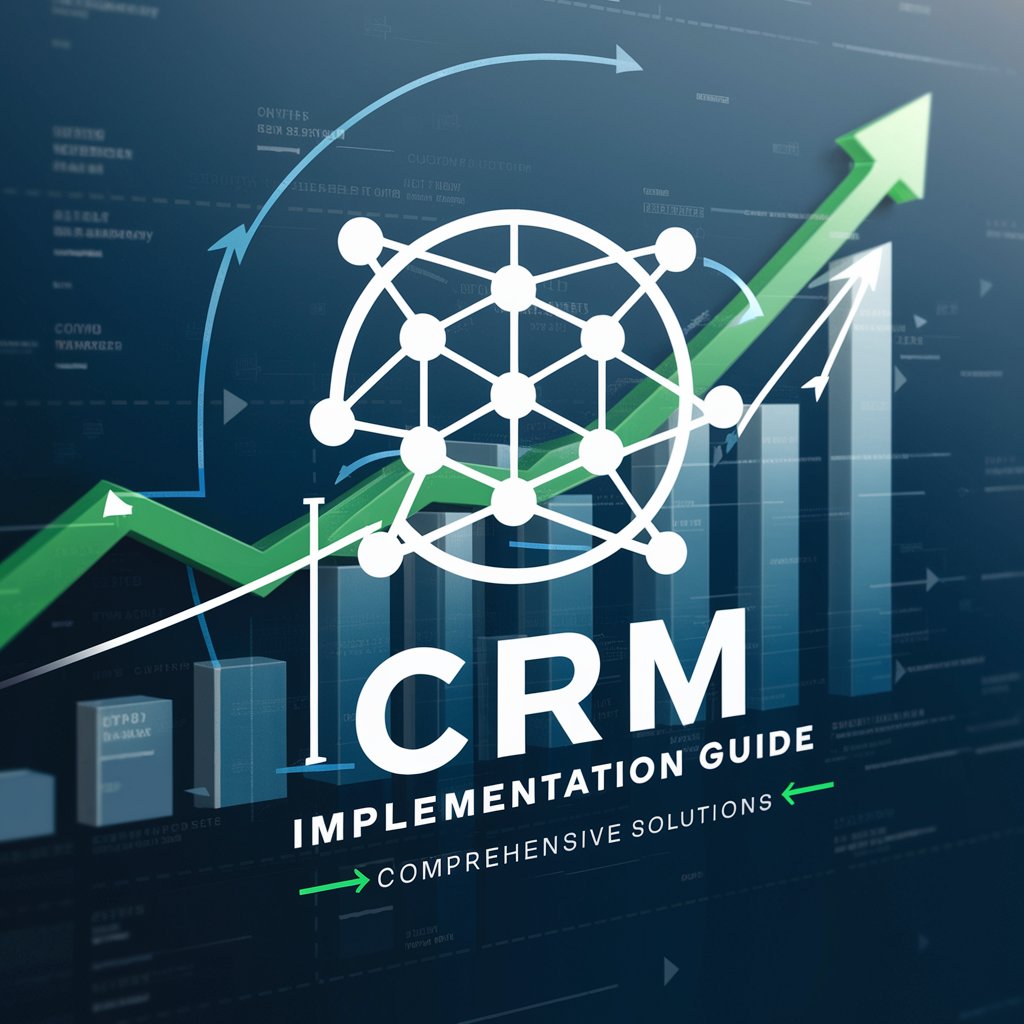CRM Implementation - CRM Strategy Insights

Welcome! Let's enhance your CRM strategy together.
Empower your business with AI-driven CRM insights.
What are the key features of...
How can businesses benefit from...
What are the best practices for...
How do I troubleshoot common issues in...
Get Embed Code
CRM Implementation: An Overview
CRM Implementation involves the strategic planning, execution, and management of a Customer Relationship Management (CRM) system within an organization. This process is designed to integrate a CRM software solution into a company's existing processes and workflows, aiming to streamline operations, enhance customer relations, and improve sales and marketing efforts. A successful CRM Implementation requires a thorough understanding of a company's goals, customer data management needs, and the alignment of these elements with the CRM system's capabilities. For example, a retail company might implement a CRM to better track customer purchase history, preferences, and feedback to personalize marketing efforts and improve customer service. This could involve automating email campaigns based on purchase history, creating customer loyalty programs, and providing sales staff with detailed customer profiles to tailor interactions. Powered by ChatGPT-4o。

Core Functions of CRM Implementation
Customer Data Management
Example
Centralizing customer data from various sources (sales, customer service, online interactions) into a unified database.
Scenario
A B2B company uses CRM to aggregate data from email interactions, sales meetings, and product usage to create comprehensive customer profiles, enabling personalized sales pitches and support.
Marketing Automation
Example
Automating repetitive tasks such as email marketing, social media posts, and targeted advertising.
Scenario
An e-commerce platform leverages CRM to segment customers based on buying behavior and preferences, automating personalized email campaigns for upcoming product launches or promotions.
Sales Force Automation
Example
Streamlining the sales process with tools for managing leads, deals, and sales pipelines.
Scenario
A software company uses CRM to track potential clients through the sales pipeline, automate follow-ups, and provide sales teams with real-time insights into client engagement and deal status.
Customer Service and Support
Example
Integrating tools for ticketing, live chat, and customer feedback to enhance service quality.
Scenario
A hospitality business implements CRM functionalities to manage and respond to customer service inquiries across multiple channels (email, social media, phone) efficiently, ensuring a consistent and personalized customer experience.
Analytics and Reporting
Example
Providing detailed reports and analytics on customer behavior, sales trends, and marketing effectiveness.
Scenario
A retail chain uses CRM analytics to monitor sales performance across regions, identify high-value customers, and optimize marketing campaigns for increased ROI.
Who Benefits from CRM Implementation?
Small and Medium-Sized Enterprises (SMEs)
SMEs benefit significantly from CRM Implementation as it allows for scalable solutions to manage customer data, automate marketing, and streamline sales processes without the need for extensive IT resources. CRM systems help SMEs to compete more effectively by providing insights into customer preferences and behavior, facilitating personalized customer experiences.
Large Enterprises
For large enterprises, CRM Implementation offers a way to unify customer data across global operations, providing a cohesive view of customer interactions across all touchpoints. It supports complex sales cycles, extensive marketing campaigns, and a high volume of customer interactions, making it essential for maintaining competitive advantage and driving customer-centric strategies.
B2B Companies
B2B companies can leverage CRM Implementation to manage long sales cycles, complex relationships, and extensive customer data. CRM systems enable these companies to maintain detailed records of interactions, automate follow-ups, and tailor communications to the specific needs and stages of each prospect, enhancing relationship management and sales outcomes.
B2C Companies
B2C companies use CRM systems to handle high volumes of transactions and customer interactions. CRM Implementation helps these companies in segmenting customers, personalizing marketing efforts, and managing customer service efficiently, crucial for building brand loyalty and enhancing customer satisfaction.

Guidelines for CRM Implementation Usage
1
Begin by exploring CRM features on yeschat.ai for a no-cost, sign-up free trial, offering access without needing ChatGPT Plus.
2
Identify your business needs and objectives to select the appropriate CRM features, such as sales tracking, customer service management, or marketing automation.
3
Customize your CRM dashboard and settings to match your business processes, ensuring it integrates seamlessly with existing workflows and tools.
4
Train your team on how to use the CRM effectively, focusing on data entry standards, navigation, and leveraging analytics for decision-making.
5
Regularly review CRM data and feedback to optimize its use, adapting strategies and features to improve customer relationships and achieve business goals.
Try other advanced and practical GPTs
Property Scout
AI-driven Real Estate Insights

Nuwonder_v2
Empower Your Words with AI

GPT-Vetting
Streamline Hiring with AI Insights

Girl
Empowering Girls with AI Guidance

Ads Optimizer
Elevate Your Ads with AI Precision

TAHFM Social Media Assisstant
Empowering Healthcare Facilities with AI-driven Social Media Content

Masonry
Expert guidance at your fingertips

Dreamy Sleep Advisor
Empowering Restful Nights with AI

PapaGPT's Roman Enhancer
Elevate Your Story with AI-Powered Insights

Cinematography
Elevating Visual Stories with AI

LinguaTalk
Enhance language skills with AI

Digital transformation Consultant
Empowering your digital journey with AI.

CRM Implementation Q&A
What are the key benefits of implementing a CRM system?
CRM systems offer enhanced customer relationship management, improved sales tracking, and efficient data management, leading to better decision-making, increased sales, and enhanced customer satisfaction.
Can CRM Implementation assist in choosing the right CRM platform?
Yes, it provides insights on different CRM platforms, focusing on their strengths, weaknesses, and suitability for various business sizes and industries.
How does CRM Implementation help in training staff?
It offers guidance on creating effective training programs, including custom tutorials, best practices, and strategies for encouraging user adoption and maximizing CRM potential.
What are common challenges in CRM implementation and how can they be addressed?
Common challenges include data migration, user resistance, and system integration. Address these by ensuring thorough planning, engaging stakeholders early, and providing continuous support and training.
How can CRM Implementation improve customer satisfaction?
By leveraging CRM analytics to understand customer behavior and preferences, businesses can tailor their services and communications, leading to improved customer experiences and loyalty.
